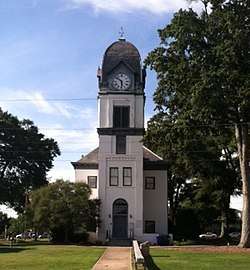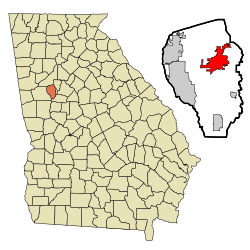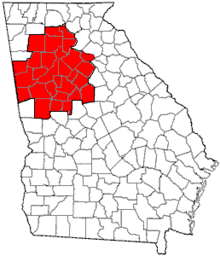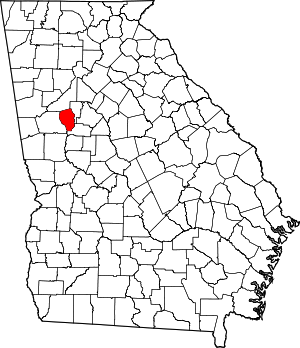Fayetteville, Georgia
Fayetteville is a city and the county seat of Fayette County, Georgia, United States[5]. As of the 2010 census, the city had a population of 15,945,[6] up from 11,148 at the 2000 census. Fayetteville is located 22 miles (35 km) south of downtown Atlanta.[7]
Fayetteville, Georgia | |
|---|---|
 Fayette County Courthouse | |
| Motto(s): "A History with a Future" | |
 Location in Fayette County and the state of Georgia | |
| Coordinates: 33°26′52″N 84°27′42″W | |
| Country | United States |
| State | Georgia |
| County | Fayette |
| Established | March 28, 1822 |
| Incorporated (town) | 1823 |
| Incorporated (city) | 1888 |
| Government | |
| • Type | Council/Manager |
| • Mayor | Ed Johnson |
| • City Manager | Ray Gibson |
| Area | |
| • Total | 13.10 sq mi (33.93 km2) |
| • Land | 12.88 sq mi (33.37 km2) |
| • Water | 0.22 sq mi (0.56 km2) |
| Elevation | 1,030 ft (313.9 m) |
| Population (2010) | |
| • Total | 15,945 |
| • Estimate (2019)[2] | 17,991 |
| • Density | 1,396.49/sq mi (539.21/km2) |
| Time zone | UTC-5 (Eastern (EST)) |
| • Summer (DST) | UTC-4 (EDT) |
| ZIP codes | 30214-30215 |
| Area code(s) | 770 404, 678 |
| FIPS code | 13-28968[3] |
| GNIS feature ID | 0314089[4] |
| Website | www |
In 2015 the small majority-white city elected its first African-American mayor, Edward Johnson, a retired US navy commander and pastor. In 2011 he was elected as the first black city council member. He was a three-term president of the NAACP.[8][9]
History
Fayetteville was founded in 1822 as the seat of the newly formed Fayette County, organized by European Americans from territory ceded by force the Creek people under a treaty with the United States during the early period of Indian removal from the Southeast. Both city and county were named in honor of the Revolutionary War hero the French Marquis de Lafayette. Fayetteville was incorporated as a town in 1823 and as a city in 1909.[10]
The area was developed for cotton plantations, with labor provided by enslaved African Americans, who for more than a century comprised the majority of the county's population. Fayetteville became the trading town for the agricultural area.
In the first half of the 20th century, as agriculture became more mechanized, many African-American workers left the area in the Great Migration to northern and midwestern industrial cities, which had more jobs and offered less oppressive social conditions.
A reverse migration has brought new residents to the South, and the city of Fayetteville has grown markedly since 2000, as has the county. The city's population has increased from 11,148 in 2000 to an estimated 16,990 in 2015.[11]
Government
The city has a mayor-council form of elected government. Council members are elected from single-member districts, and the mayor is elected at-large in a non-partisan race.[8]
In 2015 Edward Johnson was elected mayor, the first African American to serve in the position. The retired US Naval Commander and pastor of Fayette County's oldest black church is described as a consensus builder. In 2011 Johnson was elected as the first black member of the city council after having served three terms as president of the local chapter of the NAACP.[8]
Demographics
| Historical population | |||
|---|---|---|---|
| Census | Pop. | %± | |
| 1880 | 138 | — | |
| 1890 | 380 | 175.4% | |
| 1900 | 430 | 13.2% | |
| 1910 | 709 | 64.9% | |
| 1920 | 952 | 34.3% | |
| 1930 | 796 | −16.4% | |
| 1940 | 832 | 4.5% | |
| 1950 | 1,032 | 24.0% | |
| 1960 | 1,389 | 34.6% | |
| 1970 | 2,160 | 55.5% | |
| 1980 | 2,715 | 25.7% | |
| 1990 | 5,827 | 114.6% | |
| 2000 | 11,148 | 91.3% | |
| 2010 | 15,945 | 43.0% | |
| Est. 2019 | 17,991 | [2] | 12.8% |
| U.S. Decennial Census[12] | |||
As of the 2010 census,[13] there were 15,945 people, 6,006 households, and 4,264 families residing in the city. The racial makeup of the city was 55.0% White, 33.9% African American, 0.4% Native American, 6.6% Asian, 0.1% Pacific Islander, 1.3% from other races, and 2.8% from two or more races. Hispanic or Latino of any race were 4.8% of the population.
Out of the 6,006 households, 39.7% had individuals under the age of 18. 51.8% of households were married couples living together, 16.0% had a female householder with no husband present, and 29.0% were non-families. 26.4% of all households were made up of individuals, and 12.0% had someone living alone who was 65 years of age or older. The average household size was 2.59, and the average family size was 3.14.
In the city, the age distribution was 26.7% under the age of 18, 7.4% from 18 to 24, 9.1% from 25 to 34, 15.4% from 35 to 44, 15.9% from 45 to 54, 11.4% from 55 to 64, and 14.0% who were 65 years of age or older. The median age was 39.9 years. The population was 54.4% female and 45.6% male.
As of the most recent community survey, the median income for a household in the city was $62,037 and the median income for a family was $81,613. About 6.5% of families and 8.9% of the population were below the poverty line, including 13.3% of those under age 18 and 6.1% of those age 65 or over.
Education
Since 2013, members of the Fayette County School Board have been elected from single-member districts, rather than at-large, following a federal court ruling in a voting rights case. Leonard Presberg was first appointed to fill a seat, then elected on his own right to serve on the school board.[14] In January 2016 the school board voted unanimously to settle their appeals case and accept single-member districts as the basis of electing members.[15]
Fayette County School District
The Fayette County School District holds pre-school to grade twelve, and consists of fifteen elementary schools, five middle schools, and five high schools, as well as an alternative education program and Open Campus for middle and high school students.[16] The district has 1,379 full-time teachers and over 20,756 students.[17]
Fayette County High School, Whitewater Middle School, Whitewater High School, Sandy Creek High School, and Starr's Mill High School serve the Fayetteville area.
Private schools include Counterpane School, Our Lady of Mercy Catholic High School, Rising Star Montessori Academy, and Grace Christian Academy.
Points of interest
The Fayette County Courthouse, built in 1825 four years after the county and town's founding, is the oldest surviving courthouse in Georgia. The courthouse is located in the center of the Fayetteville town square. Since the construction of a new courthouse, the 1825 building has been adapted for use as the local welcome center. It holds offices for Fayetteville Main Street and the Fayette County Development Authority.
The Holliday-Dorsey-Fife House was built in 1855 by John Stiles Holliday, uncle of the western gambler John Henry "Doc" Holliday. Operated as a house museum, it is open to the public, Tuesday - Saturday, as the Holliday Dorsey Fife Museum.
The Margaret Mitchell Library, built in 1948 and named in honor of the author, serves as the headquarters of the Fayette County Historical Society. Among its holdings are Civil War and genealogical records.
Fun Spot America Atlanta, formerly known as Fun Junction USA & Dixieland Fun Park, established in 1990, is the third-largest amusement park in Georgia. It has received awards for its annual Halloween festival. In 2011, a lawsuit filed by an African-American employee prompted the NAACP to boycott the park after the owners were accused of racial profiling. In 2013, the owner John Williams was sued in court on charges of using racial epithets in reference to black go-kart operators.
Pinewood Atlanta Studios opened here in 2014; it is owned and operated by the noted Pinewood Studios of London, United Kingdom. It is the largest film and television production studio in the United States outside the state of California. The studio has produced many large budget films such as Avengers: Infinity War, Avengers: Endgame, and Thor Ragnarok.[18]
The house that Chris and Nancy Benoit lived in and the site of The Benoit tragedy
Notable people
- Paris Bennett, American Idol Season 5: fifth place finalist
- Nancy Benoit, professional wrestling manager
- Chris Benoit, professional wrestler
- Big Boi, rapper/actor
- Brandon Boykin, former NFL player for Philadelphia Eagles
- Zac Brown, Grammy Award-winning country music singer
- Kandi Burruss, former Xscape member
- Matt Daniels, football player for St. Louis Rams
- Creflo Dollar, televangelist
- Hugh M. Dorsey, governor of Georgia
- Mike Hilton, NFL defensive back
- Edward Johnson, retired US Navy Commander, pastor, activist (three-term president of local NAACP) and politician: in 2011 first African American elected to Fayetteville City Council, and first African American elected as mayor of city (2015)[9][8]
- Ufomba Kamalu, NFL defensive end for Houston Texans
- Emmanuel Lewis, actor, Webster
- Christopher Massey, actor, musician, director, film producer
- Kyle Massey, actor, musician, Dancing with the Stars
- Ann Nesby, Grammy Award-winning singer and actress
- Kelley O'Hara, player for United States women's national soccer team and plays for Utah Royals FC in the National Women's Soccer League. Kelley is also an Olympic and World Cup champion
- Paul Orndorff, professional wrestler
- Tyler Perry, filmmaker, playwright, actor
- Plumb (born Tiffany Arbuckle Lee), songwriter, recording artist, performer and author
- Keshia Knight Pulliam, actress, The Cosby Show, Tyler Perry's House of Payne
- William Regal (born Darren Matthews), English professional wrestler
- Millie Bobby Brown, actress
- Ferrol Sams, author
- Speech, leader of Arrested Development
- Hossein Khosrow Ali Vaziri ("The Iron Sheik"), Iranian professional wrestler
- Anna Munzenmaier, "The World's Strongest Cheerleader"
- Gary Anthony Williams, actor and star of Special Agent Oso on Disney Channel
- Phil Cofer, Basketball player for the Florida State Seminoles
- Niko Goodrum, Major League Baseball player for the Detroit Tigers
References
- "2019 U.S. Gazetteer Files". United States Census Bureau. Retrieved July 9, 2020.
- "Population and Housing Unit Estimates". United States Census Bureau. May 24, 2020. Retrieved May 27, 2020.
- "U.S. Census website". United States Census Bureau. Retrieved 2008-01-31.
- "US Board on Geographic Names". United States Geological Survey. 2007-10-25. Retrieved 2008-01-31.
- "About Fayette County". Fayette County Administration. Retrieved 11 April 2020.
- "Archived copy". Archived from the original on 2012-05-05. Retrieved 2011-11-20.CS1 maint: archived copy as title (link)
- "Fayetteville, Georgia (GA 30214, 30215) profile: population, maps, real estate, averages, homes, statistics, relocation, travel, jobs, hospitals, schools, crime, moving, houses, news, sex offenders". City-data.com. Retrieved 2017-07-31.
- Tammy Joyner, "Fayetteville’s first black mayor is ‘bridge builder’", Atlanta Journal-Constitution, 7 November 2015; accessed 13 December 2016
- Timothy Pratt, "New black mayors make a difference, one Georgia town at a time", Al-jazeera (US), 16 February 2016; accessed 12 December 2016
- Hellmann, Paul T. (May 13, 2013). Historical Gazetteer of the United States. Routledge. p. 229. ISBN 1135948593. Retrieved 30 November 2013.
- "Annual Estimates of the Resident Population for Incorporated Places: April 1, 2010 to July 1, 2015". Archived from the original on June 2, 2016. Retrieved July 2, 2016.
- "Census of Population and Housing". Census.gov. Retrieved June 4, 2015.
- Bureau, U.S. Census. "U.S. Census website". United States Census Bureau. Retrieved 31 July 2017.
- "Fayette chooses ‘discriminatory’ at-large voting to replace Coston, Democrats charge" Archived 2016-12-21 at the Wayback Machine, The Citizen, 13 July 2015; accessed 13 December 2016
- Tammy Joyner, "Fayette County Voting Rights Timeline", Atlanta Journal-Constitution, 13 January 2016; accessed 13 December 2016
- "School Directory / School Directory". Fcboe.org. Retrieved 31 July 2017.
- "Free District Report for Fayette County". School-stats.com. Retrieved 31 July 2017.
- Hensley, Ellie (October 14, 2016). "Pinewood Atlanta Studios to become largest studio complex in U.S. outside of L.A." Biz Journals.
Further reading
- Charles S. Bullock III and Ronald Keith Gaddie, The Triumph of Voting Rights in the South (University of Oklahoma Press, 2009/2014)
External links
- City of Fayetteville official website
- Fayetteville Downtown Development Authority
- Fayette County Development Authority
- Flat Rock African Methodist Episcopal Church historical marker
- Starr's Mill historical marker
- The Holliday-Dorsey-Fife House historical marker

